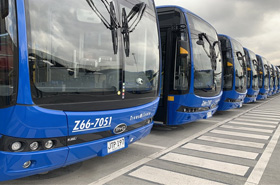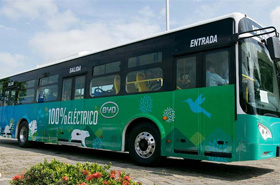Advantages And Disadvantages Of Electric Bus
Advantages And Disadvantages Of Electric Bus
Electric bus, also known as new energy bus, is a bus driven by electricity. It has many advantages, but also has disadvantages. However, with the development of technology, these shortcomings will be overcome. Let's learn about the advantages and disadvantages of electric buses.
.png)
Definition of electric bus
Electric bus refers to the bus powered by on-board power supply and equipped with appropriate on-board storage battery or cable power supply equipment to provide electric driving, including pure electric bus, hybrid drive bus and fuel cell bus.
1. Advantages of electric bus
(1) Non-pollution: electric passenger cars have no exhaust gas generated by internal combustion engines when they work, and do not produce exhaust pollution, which is beneficial to environmental protection and air cleaning
(2) Low noise: electric passenger cars have no noise generated by internal combustion engines, and the noise of motors is also lower than that of internal combustion engines.
(3) High energy efficiency: the energy efficiency of the electric bus has exceeded that of the gasoline engine car. It does not consume electricity when it stops. During the braking process, the motor can be automatically converted into a generator to realize the reuse of energy during braking deceleration.
(4) Energy diversification: electric buses use electricity as energy, and electricity can be converted from coal, natural gas, hydropower, nuclear energy, solar energy, wind, tide and other energy.
In addition, if the battery is charged at night, it can also avoid the peak power consumption, which is conducive to balancing the load of the grid and reducing costs.
(5) Simple structure and convenient maintenance: compared with the internal combustion engine bus, the electric bus has simple structure, less running and transmission parts, less maintenance work, and more importantly, the electric bus is extremely easy to operate.
2. Disadvantages of electric bus
(1) The battery stores too little energy per unit weight and has a short battery life
(2) The battery of electric bus is more expensive and has not formed an economic scale. If there is no subsidy, the price is more expensive than that of fuel bus; In terms of use cost, the use cost varies according to the battery life and local oil and electricity prices
(3) In terms of technology, electric passenger cars are not as technologically perfect as internal combustion engines
Electric bus refers to the bus powered by on-board power supply and equipped with appropriate on-board storage battery or cable power supply equipment to provide electric driving, including pure electric bus, hybrid drive bus and fuel cell bus.
1. Advantages of electric bus
(1) Non-pollution: electric passenger cars have no exhaust gas generated by internal combustion engines when they work, and do not produce exhaust pollution, which is beneficial to environmental protection and air cleaning
(2) Low noise: electric passenger cars have no noise generated by internal combustion engines, and the noise of motors is also lower than that of internal combustion engines.
(3) High energy efficiency: the energy efficiency of the electric bus has exceeded that of the gasoline engine car. It does not consume electricity when it stops. During the braking process, the motor can be automatically converted into a generator to realize the reuse of energy during braking deceleration.
(4) Energy diversification: electric buses use electricity as energy, and electricity can be converted from coal, natural gas, hydropower, nuclear energy, solar energy, wind, tide and other energy.
In addition, if the battery is charged at night, it can also avoid the peak power consumption, which is conducive to balancing the load of the grid and reducing costs.
(5) Simple structure and convenient maintenance: compared with the internal combustion engine bus, the electric bus has simple structure, less running and transmission parts, less maintenance work, and more importantly, the electric bus is extremely easy to operate.
2. Disadvantages of electric bus
(1) The battery stores too little energy per unit weight and has a short battery life
(2) The battery of electric bus is more expensive and has not formed an economic scale. If there is no subsidy, the price is more expensive than that of fuel bus; In terms of use cost, the use cost varies according to the battery life and local oil and electricity prices
(3) In terms of technology, electric passenger cars are not as technologically perfect as internal combustion engines
3.What is the voltage of electric bus
The new energy bus is powered by electricity. Its battery is not a battery, but a battery pack composed of many batteries. What is the voltage of the electric bus? The voltage of different electric buses is also different. The voltage of ordinary electric buses is about three or four hundred volts. The common ones are 336V and 384V. The voltage of electric buses is higher, generally 580V-600V. The higher the bus voltage is, the wider the speed range of constant power of the motor.
Related Products



.jpg)
.jpg)





